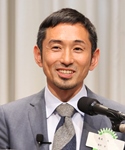Potentiality of Sports
April 15, 2015
Mr. Dai Tamesue
Chairman of Athlete Society
�� At the outset, let me share two video footages. The first footage is the men��s 200 meter race at the London Paralympics, which made Alan Oliveira from Brazil the gold medalist. He keeps setting new records to date. The second one is a German long jumper Markus Rehm who uses a prosthetic leg. He won the German Athletics last year with the record of 8.24 meters which equals to the Olympic silver medal. I believe Paralympians will outperform the able-bodied Olympians before long.
At the outset, let me share two video footages. The first footage is the men��s 200 meter race at the London Paralympics, which made Alan Oliveira from Brazil the gold medalist. He keeps setting new records to date. The second one is a German long jumper Markus Rehm who uses a prosthetic leg. He won the German Athletics last year with the record of 8.24 meters which equals to the Olympic silver medal. I believe Paralympians will outperform the able-bodied Olympians before long.
��I work on a project to develop prosthetic legs, jointly with Dr. Endo from the Media Lab of the Massachusetts Institute of Technology. Dr. Endo had conducted research on bipedal walking robots until he was inspired by his friend who had an amputation and decided to move to the US to ��develop a technology that enables everyone to walk.��
��Our project aims to provide the ��fastest, best and lowest price�� prosthetic limbs. I believe when Paralympians come to outperform Olympians, it will bring about changes in societal attitudes towards the handicapped to be considered only as having a unique trait. Also, advancement in prosthetic limbs for athletes will lead to the development of user-friendly prosthetics for daily use. We also aim to make them cost less than 20 dollars as majority of people who need prosthetics live in developing countries and they cannot afford expensive ones.
��The 2020 Tokyo Olympic and Paralympics Games should be instrumental in making changes. We can learn from the successful London Games that undoubtedly made the general public to become supportive towards people in wheeled chair. We should base the 2020 Games on the concept to create barrier-free cities that are people-friendly and comfortable for all. I support such developments that will bring long-lasting changes.
��Now let me tell you what I have learned through sport and how I try to return to the society. Sir Roger Bannister from England ran the first sub-four-minute mile on 6th May 1954, a record that had been considered impossible for human beings. Interestingly enough, his record was broken 46 days later and within a year 23 athletes became sub-four-minute milers. It proves once someone overcomes a barrier, others follow to make a challenge and fulfill their potential. For example, when Hideo Nomo became the first Japanese-born baseball player to pitch in the major leagues, other players got inspired and chose to play in the US. I believe the ultimate value of sports is that people come to share the sense of overcoming their limit.
��Looking back on my active career, I had kept questioning what inhibited me and how could I overcome it. The 2000 Olympics in Sydney became the first failure I experienced as a hurdler. I fell at the 9th hurdle and lost in the preliminary round. I recall that I felt uncomfortable as I jumped each hurdle. I couldn��t tell what was wrong but the uneasiness got stronger each time. By the time I reached the 9th hurdle, I had lost the sense of distance between the hurdle and myself, bumped into the hurdle and fell down. After coming back from Sydney, I took a break for about a month and restarted my training only to find no technical problem. I finally took the time to review the video footage of the race and found out the stadium was exposed to a stiff breeze. The hurdles are placed 35 meters apart and I usually made 13 steps between them. But if I had to race in a headwind or tailwind, it will cause an error of a few centimeters each time I make a jump. By the time I reach the 9th hurdle, the gap can become 30 centimeters. In Sydney, the tailwind made me too close to the hurdle to jump.
��I realized the stadiums in Japan are designed to minimize the effects of wind. Therefore, I decided to go overseas to race at stadiums in different settings. In 2001, I chose to run in 4 races in 4 different cities (Rome, Zagreb, Lausanne and Paris) in 8 days. My failure at the Sydney Olympics had made me somehow feel uneasy about the 9th hurdle and my speed slowed down as I tried to jump over it safely. I was able to overcome anxiety at the race in Paris that concluded the intensive race tour. I regained my confidence and became the first Japanese track athlete to win the bronze medal at the World Championships later that year.
��I believe sports make us challenge our own limits with all our heart. I built my inner strength as I faced my failure and worked wholeheartedly to overcome it. The whole process has become my most precious life asset.
��Besides the project for prosthetics, I teach sports to children in developing countries to encourage them to participate in the 2020 Tokyo Olympics. I hope we will host the Games with the largest number of athletes. It is my sincere wish that each one of us will share the excitement of the 2020 Games either by participating, watching or supporting the events. I also hope it will be a good opportunity for us to overcome our limits and to develop a spirit of good will.